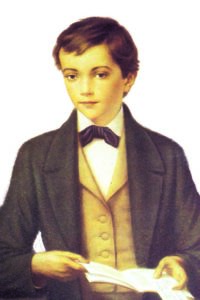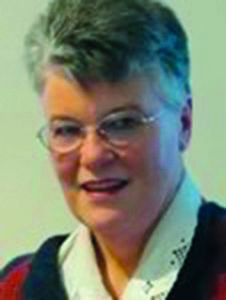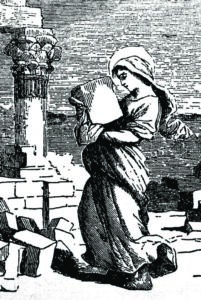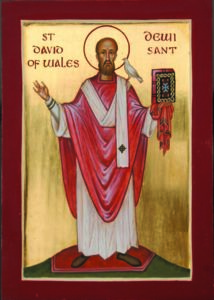March Saints

Feast: 5 May

Kilian de Lacy
Saint Dominic
Savio
(1842-1857)
Dominic was the son of a very poor blacksmith. By the age of four, he knew all his prayers, and at five, he was an altar boy. When he made his First Holy Communion at age seven, he chose a motto, "Death, but not sin!" And he kept it always.
From when he was very young, he practised heroic virtue. Once, wrongly accused in school, he meekly accepted punishment. When the truth came out, he pleaded for the real culprits who were facing expulsion. His explanation? "I remembered that our Lord was unjustly accused and said nothing".
In 1854, he went to Turin and became a pupil at St John Bosco's Oratory. Here he worked, studied, played and prayed for three years before his final illness forced him to return home. The other students recognised that he was different from the way he prayed.
Sometimes he tended to take his decision to be a saint too seriously. At one stage he refused to play his usual games and put on a long, serious face. Don Bosco put paid to that, saying that serving God is the way to true happiness and it should show. Dominic took the lesson to heart and became an apostle of cheerfulness.
He was well aware that virtue cannot survive without penance and was keen to fast or practise physical mortifications, despite his poor health. However, when his confessor forbade such practices, he learned that his penance was obedience, enduring everything for the love of God.
At a time when frequent communion was rare, Dominic was permitted to receive his Lord every day.
Never in robust health, Dominic became seriously ill in 1857 and cheerfully submitted to the painful treatments prescribed by his doctors. His condition worsened, and he died shortly afterwards, saying, "What a beautiful thing I see". He is the patron of choirboys and the falsely accused.
Saint Dominic, help us to avoid sin always.
Source: Internet – various

Feast: 24 July
Saint Euphrasia
(d. c. 420)
Euphrasia was the daughter of Antigonus, a senator of Constantinople, and a relation of Emperor Theodosius. Her father died shortly after her birth, and her mother, also Euphrasia, devoted her life from then on exclusively to the service of God. To carry out this ideal she abandoned Constantinople, and, with her seven-year-old daughter, travelled to Egypt, where she dwelt on one of her estates, near a convent, and adopted the nuns' austere mode of life.
The nuns' example aroused in her daughter the desire to enter the convent, and her mother gave her into the care of the superior so that she could receive training in the ascetic life. After her mother's death, she declined an offer of marriage and transferred her entire fortune, to be used for charitable purposes, to the emperor. She took up the rigorous practices necessary to achieve Christian perfection. She was about thirty when she died.
The Greek Church celebrates her feast on 25 July, and in the Latin Church on 13 March. She is mentioned by St. John Damascene, in one of his works.
Saint Euphrasia, obtain for us a real desire to serve God in our day to day lives.
Source: www.newadvent.org/cathen/05606b.htm

Feast: 1 March
Saint David of Wales
(d. c. 600)
The son of a local ruler of South Wales, David became a priest, studying under St Paulinus for several years.
He attended the Synod of Brefi in 545, and he was elected to be primate of the Church in this region.
He founded at least twelve monasteries. The monks followed an extremely austere rule which included complete abstinence from wine, and consequently, they were known as the 'Watermen'.
While on a pilgrimage to the Holy Land, David was ordained a bishop by the Patriarch of Jerusalem. Returning to Wales, he convoked the Synod of Victory that effectively ended the Pelagian heresy in the British Isles.
Pope Callistus II approved David's cult in about 1120. He is the patron saint of Wales.
Saint David, protect all Welsh people from harm.
Source: Encyclopedia of the Saints, Matthew, Margaret & Stephen Bunson, 1998, Our Sunday Visitor Publishing, Indiana
 Entries(RSS)
Entries(RSS)